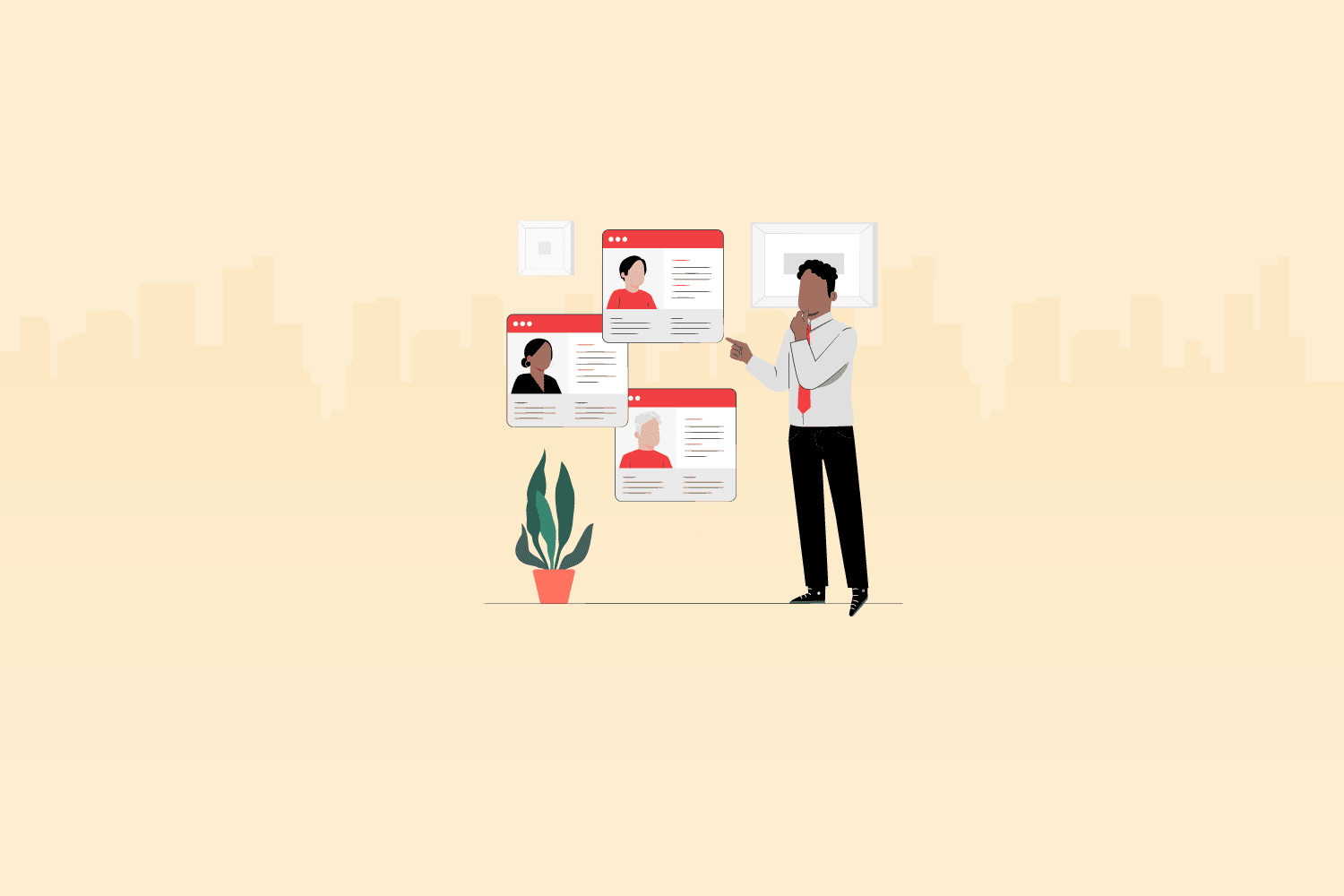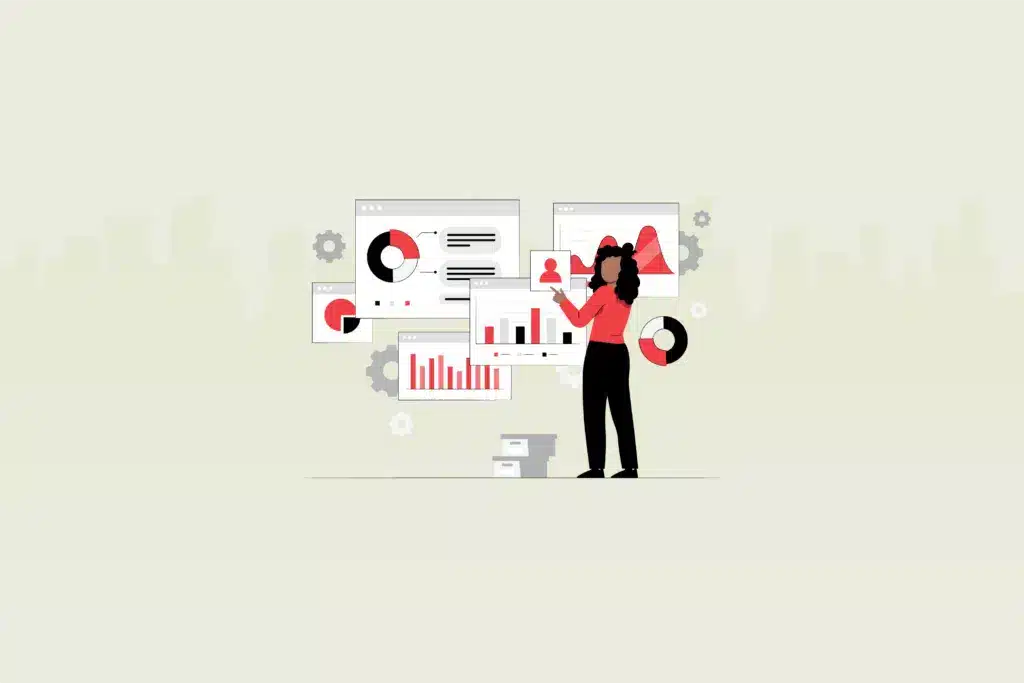The role of an Accounts Receivable Manager holds immense importance in today’s business landscape, where managing cash flow and optimizing revenue collection is crucial for organizations’ financial health. As HR professionals and CXOs strive to attract top talent for this pivotal position, it is essential to understand the evolving recruiting trends in this field.
According to recent analytics, the demand for skilled Accounts Receivable Managers has witnessed a steady rise, reflecting the growing recognition of their strategic value. Organizations are increasingly seeking professionals who possess a comprehensive understanding of financial operations, excellent communication skills, and a proven track record in streamlining collections processes. In this dynamic landscape, it is crucial to craft interview questions that help identify individuals who can proactively manage accounts receivable, drive operational efficiency, and contribute to long-term financial success.
Here are the top 60 Accounts Receivable Manager interview questions to ask job applicants:
15 general interview questions for the Accounts Receivable Manager
- Can you provide an overview of your experience and qualifications related to accounts receivable management?
- How do you ensure timely and accurate invoicing and billing processes?
- What strategies do you employ to minimize the risk of bad debt and delinquent accounts?
- Describe your approach to developing and implementing effective credit and collection policies.
- How do you handle disputes and resolve issues related to customer accounts?
- Can you share your experience in using accounting software or ERP systems for accounts receivable management?
- How do you monitor and analyze key performance indicators (KPIs) for accounts receivable?
- Can you describe a situation where you implemented process improvements to enhance the efficiency of accounts receivable operations?
- How do you collaborate with sales and customer service teams to ensure accurate and up-to-date customer information?
- Can you share an example of how you have successfully managed a large portfolio of accounts receivable?
- How do you prioritize and manage collections activities to maximize cash flow?
- Describe your experience in working with external collections agencies or legal partners, if applicable.
- How do you maintain positive relationships with customers while enforcing payment terms and collection efforts?
- Can you explain your approach to forecasting and reporting on accounts receivable performance?
- How do you stay updated with industry best practices and regulations related to accounts receivable management?
5 sample answers to general interview questions for the Accounts Receivable Manager
- How do you ensure timely and accurate invoicing and billing processes?
Look for: Attention to detail, organization, and knowledge of invoicing systems.
Answer: “To ensure timely and accurate invoicing and billing, I prioritize maintaining an organized system where all customer information, purchase orders, and pricing details are accurately recorded. I utilize invoicing software to generate invoices promptly and cross-reference them with sales orders to verify accuracy. Regular reconciliation processes help identify any discrepancies or errors, which can be promptly addressed before sending invoices to customers.”
- How do you handle disputes and resolve issues related to customer accounts?
Look for: Conflict resolution skills, customer service orientation, and the ability to find win-win solutions.
Answer: “When it comes to handling disputes and resolving customer account issues, I believe in a proactive and customer-centric approach. I prioritize open communication and active listening to understand the customer’s concerns. I work closely with the customer and internal teams, such as sales or customer service, to find mutually beneficial solutions. By empathizing with the customer’s situation and exploring alternative options, I aim to maintain positive relationships while ensuring payment terms are met.”
- Can you describe a situation where you implemented process improvements to enhance the efficiency of accounts receivable operations?
Look for: Analytical skills, problem-solving abilities, and continuous improvement mindset.
Answer: “In my previous role, I noticed a significant delay in the collection process due to manual data entry and lack of automation. To enhance efficiency, I implemented an automated payment reminder system that sent personalized emails to customers with upcoming due dates. Additionally, I introduced a digital invoicing system to reduce errors and accelerate the billing process. These process improvements resulted in a 20% reduction in overdue accounts and improved cash flow within three months.”
- How do you prioritize and manage collections activities to maximize cash flow?
Look for: Strong organizational skills, ability to set priorities, understanding of risk assessment.
Answer: “To prioritize and manage collections activities effectively, I adopt a systematic approach. I analyze the aging report to identify high-risk accounts and prioritize collections efforts accordingly. By implementing a tiered approach, I focus on high-value accounts or those with a history of late payments. I also establish clear communication channels and set up regular follow-ups to maintain consistent contact with customers. Through this method, I have consistently improved collections rates and accelerated cash flow for the organization.”
- Can you explain your approach to forecasting and reporting on accounts receivable performance?
Look for: Analytical skills, financial acumen, ability to generate insights from data.
Answer: “When it comes to forecasting and reporting on accounts receivable performance, I rely on accurate data analysis and financial insights. I closely monitor key performance indicators (KPIs) such as Days Sales Outstanding (DSO) and aging reports to identify trends and patterns. By examining historical data and considering market conditions, I can make informed forecasts for cash flow projections. I then generate comprehensive reports that highlight trends, areas for improvement, and actionable recommendations to optimize the organization’s financial performance.”
15 behavioral interview questions for an Accounts Receivable Manager
- Tell me about a time when you had to deal with a difficult customer or client regarding an overdue payment. How did you handle the situation?
- Can you describe a time when you identified a process inefficiency in accounts receivable and implemented changes to improve it?
- Share an example of a time when you successfully reduced the organization’s average Days Sales Outstanding (DSO). What strategies did you employ?
- Tell me about a situation where you had to balance the need to collect payments with maintaining positive customer relationships. How did you approach it?
- Describe a time when you had to collaborate with the sales team to resolve a billing or invoicing discrepancy. How did you ensure a smooth resolution?
- Can you share an experience where you implemented credit control measures that reduced the risk of bad debt while maintaining customer satisfaction?
- Tell me about a time when you had to negotiate payment terms with a major client. How did you ensure a mutually beneficial agreement?
- Describe a situation where you had to work under pressure to meet tight deadlines for invoicing and collections. How did you prioritize your tasks?
- Share an example of a time when you had to analyze and resolve a complex accounts receivable issue involving multiple parties or departments.
- Tell me about a time when you identified a potentially fraudulent activity or irregularity in accounts receivable. How did you handle the situation?
- Can you describe a situation where you implemented technology or automation to streamline accounts receivable processes? What were the outcomes?
- Share an experience when you successfully trained and mentored a team member to improve their performance in accounts receivable management.
- Describe a time when you had to communicate challenging financial information or collection targets to senior management. How did you approach it?
- Can you share an example of a time when you implemented a customer credit evaluation process that resulted in better risk assessment and reduced late payments?
- Tell me about a situation where you had to handle a significant accounts receivable backlog. How did you prioritize and manage the workload effectively?
5 sample answers to behavioral interview questions for the Accounts Receivable Manager
- Tell me about a time when you had to deal with a difficult customer or client regarding an overdue payment. How did you handle the situation?
Look for: Conflict resolution skills, customer service orientation, and the ability to maintain professionalism.
Answer: “In a previous role, I encountered a challenging situation where a customer became increasingly difficult to work with regarding an overdue payment. To handle the situation, I maintained a calm and professional demeanor while actively listening to the customer’s concerns. I empathized with their frustrations and assured them that I understood their perspective. I then explained our payment terms clearly and provided alternative payment options to accommodate their circumstances. By keeping the lines of communication open and demonstrating a willingness to find a mutually agreeable solution, I was able to diffuse the tension and secure payment within an agreed-upon timeframe.”
- Can you describe a time when you identified a process inefficiency in accounts receivable and implemented changes to improve it?
Look for: Analytical skills, problem-solving abilities, and a process improvement mindset.
Answer: “During my tenure at a previous organization, I noticed a significant delay in the invoicing process, leading to cash flow bottlenecks. To address this inefficiency, I conducted a thorough analysis of the invoicing workflow and identified manual tasks that could be automated. I proposed and implemented an electronic invoicing system that streamlined the process, reduced errors, and accelerated the delivery of invoices to customers. Additionally, I developed clear guidelines and training materials for the accounts receivable team to ensure smooth adoption of the new system. As a result, the average time for invoicing and receivable processing decreased by 30%, improving cash flow and customer satisfaction.”
- Share an example of a time when you successfully reduced the organization’s average Days Sales Outstanding (DSO). What strategies did you employ?
Look for: Strategic thinking, collection strategies, negotiation skills.
Answer: “In a previous role, I implemented several strategies to reduce the organization’s DSO. Firstly, I conducted a thorough analysis of the aging report and prioritized collection efforts based on the risk level and outstanding balances. I adopted a proactive approach by contacting customers before their payment due dates to confirm receipt of invoices and address any concerns promptly. Additionally, I introduced flexible payment plans for clients facing temporary financial challenges, enabling them to meet their obligations while maintaining positive relationships. By consistently following up on outstanding invoices and employing a combination of effective communication, negotiation, and tailored collection strategies, we managed to reduce the average DSO by 15% within six months.”
- Describe a time when you had to balance the need to collect payments with maintaining positive customer relationships. How did you approach it?
Look for: Relationship management skills, diplomacy, and a customer-centric mindset.
Answer: “In my previous role, I encountered a situation where a long-standing customer was facing financial difficulties and struggling to make timely payments. While the organization needed to collect outstanding balances, I recognized the importance of maintaining positive customer relationships. I scheduled a face-to-face meeting with the customer to understand their challenges and explore mutually beneficial solutions. We agreed on a revised payment plan that aligned with their cash flow capabilities, allowing them to fulfill their obligations while minimizing the impact on their business. By prioritizing open communication, understanding the customer’s perspective, and finding a solution that met both parties’ needs, we not only maintained the relationship but also received consistent payments moving forward.”
- Can you share an experience where you implemented technology or automation to streamline accounts receivable processes? What were the outcomes?
Look for: Technological proficiency, innovation, and a process improvement mindset.
Answer: “At my previous organization, I recognized the potential of technology to streamline accounts receivable processes. I identified an opportunity to automate the payment reminder system and reduce the manual effort involved in sending reminders to customers. I implemented a robust software solution that automatically generated personalized reminders based on predefined rules and timelines. This automation significantly reduced the administrative burden on the accounts receivable team, allowing them to focus on more strategic tasks. Moreover, it resulted in a notable reduction in overdue accounts and improved overall collections by 20% within three months. The implementation of technology not only enhanced efficiency but also improved customer relationships through timely and consistent communication.”
15 personality interview questions for the Accounts Receivable Manager
- How do you handle high-pressure situations or tight deadlines in your work?
- Can you describe a time when you had to adapt your approach to accommodate the preferences or communication styles of different team members or clients?
- What motivates you to excel in your role as an Accounts Receivable Manager?
- How do you handle conflicts or disagreements within your team or with stakeholders?
- Can you share an example of when you demonstrated strong attention to detail in your work?
- Describe a time when you took the initiative to improve your knowledge or skills related to accounts receivable management.
- How do you prioritize your workload and manage multiple tasks or projects simultaneously?
- Can you describe a situation where you had to make a tough decision related to credit terms or collections policies?
- How do you stay organized and ensure accuracy in your work when dealing with a high volume of transactions or accounts?
- Share an example of when you successfully built and maintained positive relationships with customers or clients.
- How do you stay updated with industry trends and changes in regulations related to accounts receivable management?
- Describe a time when you had to communicate complex financial information to a non-financial audience. How did you ensure understanding and engagement?
- Can you share an experience where you had to handle confidential or sensitive financial information with discretion?
- How do you approach building and leading a cohesive and high-performing accounts receivable team?
- Can you describe a time when you had to navigate ambiguity or uncertainty in your role as an Accounts Receivable Manager?
5 sample answers to personality interview questions for Accounts Receivable Manager
- How do you handle high-pressure situations or tight deadlines in your work?
Look for: Stress management skills, the the ability to stay foand cused, resilience.
Answer: “When faced with high-pressure situations or tight deadlines, I remain calm and focused on the task at hand. I prioritize my workload, breaking it down into smaller, manageable tasks. By setting clear goals and deadlines, I can work systematically and efficiently. I also proactively communicate with stakeholders, such as team members or clients, to manage expectations and ensure everyone knows the timeline. Additionally, I utilize stress-management techniques like taking short breaks, practicing deep breathing, or delegating tasks when necessary. By maintaining a positive mindset and utilizing effective time management strategies, I can navigate high-pressure situations while delivering results.”
- Can you describe a time when you had to adapt your approach to accommodate the preferences or communication styles of different team members or clients?
Look for: Adaptability, interpersonal skills, and ability to build rapport.
Answer: “In my previous role, I encountered a diverse team and clients with different communication styles and preferences. To accommodate these differences, I took the time to understand their preferred communication methods and adjusted my approach accordingly. For team members who preferred concise emails, I ensured that my messages were clear, to the point, and action-oriented. For clients who preferred more frequent phone calls, I scheduled regular check-ins to provide updates and address their concerns. By adapting my communication style to meet their needs, I was able to build stronger relationships, foster collaboration, and ensure effective information exchange.”
- How do you stay organized and ensure accuracy in your work when dealing with a high volume of transactions or accounts?
Look for: Organization skills, attention to detail, and time management.
Answer: “To stay organized and maintain accuracy while handling a high volume of transactions or accounts, I rely on effective organizational strategies. I utilize digital tools and spreadsheets to track and categorize transactions, ensuring they are accurately recorded and up-to-date. I establish clear filing systems and naming conventions to easily locate documents and information when needed. Regularly reviewing and reconciling accounts helps identify any discrepancies or errors, which can be promptly addressed. Additionally, I prioritize my tasks by urgency and importance, allocating dedicated time slots for specific activities. By combining meticulous attention to detail with efficient time management, I can effectively manage the workload and maintain accuracy.”
- How do you approach building and leading a cohesive and high-performing accounts receivable team?
Look for: Leadership skills, team-building abilities, and communication.
Answer: “When building and leading an accounts receivable team, I focus on fostering a collaborative and supportive environment. I ensure open lines of communication, encouraging team members to share ideas, challenges, and feedback. Regular team meetings and one-on-one sessions allow for goal alignment, performance discussions, and recognition of achievements. I believe in empowering team members by delegating responsibilities and providing them with opportunities for growth and development. By setting clear expectations, providing training, and offering ongoing support, I create an environment where team members feel valued and motivated to perform at their best, resulting in a cohesive and high-performing team.”
- Can you describe a time when you had to navigate ambiguity or uncertainty in your role as an Accounts Receivable Manager?
Look for: Adaptability, problem-solving skills, and resilience.
Answer: “In my role as an Accounts Receivable Manager, I have encountered situations where ambiguity or uncertainty arises, such as changes in regulations or unexpected shifts in customer payment behavior. To navigate these circumstances, I first gather as much information as possible through research, seeking guidance from industry experts, or consulting with colleagues. I then assess the potential impact and explore various scenarios to develop contingency plans. By communicating transparently with stakeholders, such as senior management or clients, I ensure that everyone is informed and involved in the decision-making process. Additionally, I remain flexible and agile, ready to adjust strategies or implement new approaches as needed. By embracing ambiguity as an opportunity for growth and employing problem-solving skills, I can effectively navigate uncertainty and drive positive outcomes.”
When should you use skill assessments in your hiring process for Accounts Receivable Manager?
Skill assessments can be valuable tools in the hiring process for Accounts Receivable Manager positions. They provide an objective and standardized way to evaluate candidates’ abilities and competencies, going beyond what can be gleaned from resumes and interviews alone. Assessments help to ensure that candidates possess the necessary skills and knowledge required to excel in the role, ultimately leading to better hiring decisions.
Assessments are important because they provide insights into a candidate’s proficiency in key areas such as financial analysis, credit management, collections, and problem-solving. By assessing these skills, employers can gauge a candidate’s ability to handle the challenges and responsibilities specific to accounts receivable management. This ensures that the selected candidate is well-equipped to handle the complexities of the role and contribute effectively to the organization’s financial stability.
Some common assessments that can be used to evaluate the skills of Accounts Receivable Manager candidates include financial analysis assessments, case studies or simulations that simulate real-world accounts receivable scenarios, credit and collections knowledge assessments, and situational judgment tests. These assessments allow employers to assess candidates’ ability to analyze financial data, make sound decisions, handle customer interactions, and apply critical thinking skills in resolving accounts receivable challenges. By incorporating skill assessments into the hiring process, employers can make more informed decisions and identify the most qualified candidates for the role of Accounts Receivable Manager.
Use our interview questions and skill tests to hire talented Accounts Receivable Manager
Unlock the potential of your hiring process with Testlify’s comprehensive skill assessments and interview questions specifically designed for Accounts Receivable Manager.
Our extensive test library offers a wide range of assessments, including cognitive function, personality, situational judgment, programming, and more. By leveraging these assessments, you can objectively evaluate candidates’ abilities, ensuring you shortlist the most talented individuals efficiently.
To further enhance your hiring process, we invite you to book a free 30-minute live demo. Our expert team will guide you through the platform, showcasing relevant skill tests tailored to your hiring needs. With our support, you can streamline candidate selection, saving valuable time and resources.
Ready to find the perfect fit for your Accounts Receivable Manager role? Testlify provides the tools you need to make informed hiring decisions. Explore our skill assessments and interview questions today to uncover exceptional talent for your team.








